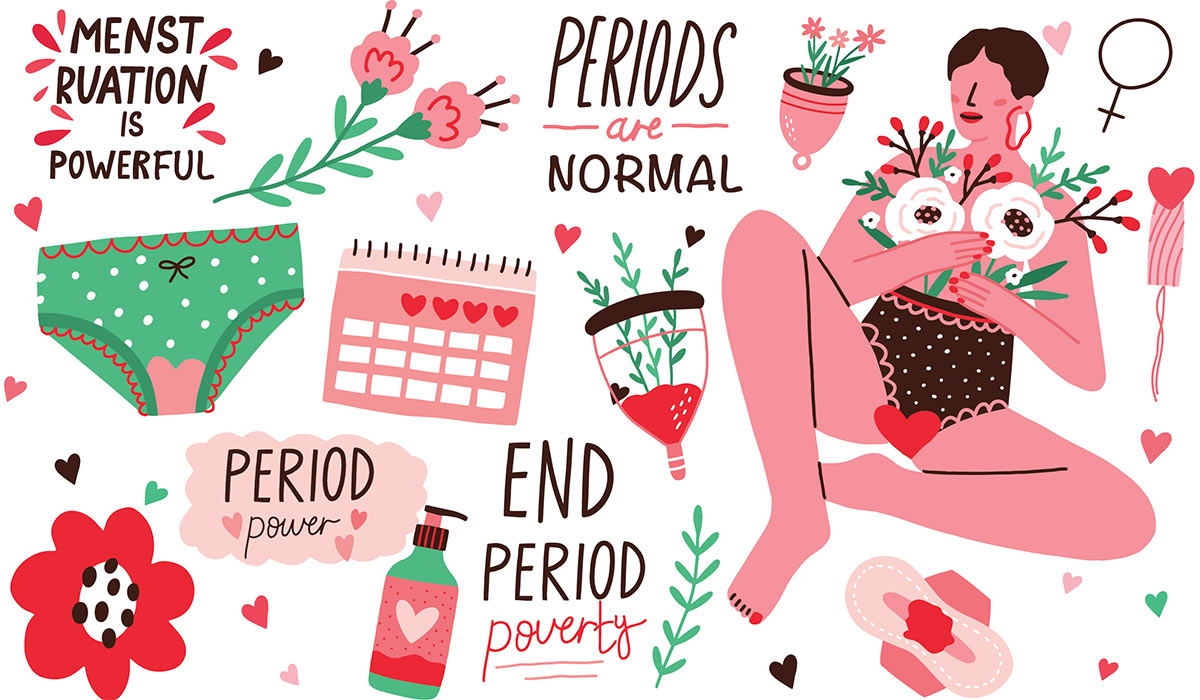21 Facts About Your Period You Should Know

When it comes to your body, knowledge is power, and this is undoubtedly the case when it comes to your menstrual cycle, AKA your period. There’s no denying that your period can be an eventful three to seven days, asides from the obvious – bleeding and organizing your menstrual care – there are cramps, headaches, mood swings, and SO much more. To help you feel empowered at every stage of your monthly cycle, here are 21 facts about your period.
1. The Average Menstruator has More Than 400 Periods in Their Lifetime
From the first menstrual cycle until menopause (when your period stops), the average menstruator will experience around 450 periods, according to an article published in the scientific journal The Lancet. During those 450 periods, the average menstruator uses between 12,000 and 15,000 pads, tampons, and panty liners, as per a Rochester Institute of Technology report.
2. Period Underwear Stains Have Happened to Everyone
 via Giphy
via Giphy
If you’ve ever stained a pair of perfectly cute underwear and felt a wave of embarrassment, stop right there because it’s happened to almost everyone. In fact, 54% of 36,000 women surveyed by THINX said they ruined every pair of underwear they owned due to their period.
3. Sleeping with a Nightlight can Help Regulate Your Cycle
The sleep hormone melatonin can impact the length of your period. Melatonin helps control the release of the reproductive hormone that influences when your menstrual cycle begins and ends.
In fact, a clinical trial revealed that menstruators with irregular cycles who slept next to a night light during the last two weeks of their cycle shortened it by an average of 12 days. However, it’s suggested that you shouldn’t sleep with a night light for the full cycle – only for the last two weeks – otherwise, it could make your period more irregular.
4. You can be More Forgetful on Your Period
 via Giphy
via Giphy
According to the menstrual health app, Flo, “difficulty in concentrating, forgetfulness, paranoia,” as well as “decreased coordination” are all caused by hormonal misbalances, which are triggered during your monthly cycle.
To combat forgetfulness and paranoia, Flo suggests, “Write down your plans on a piece of paper and promise yourself to revisit it in a week’s time – just so you can re-address the issue with a clearer mind.” If you experience these symptoms severely, you can also take magnesium supplements, and Flo also suggests you “limit your intake of liquids and salts.”
5. The Color of Your Menstrual Blood Could be Trying to Tell You Something
Most people who menstruate will notice their period doesn’t remain the same color from beginning to end; it may appear bright red for the first few days and a deeper, brownish-red towards the end. However, you should pay attention as it can tell you different things about your health.
Both bright and dark red indicates a healthy period; however, purple/blue-tinted blood could suggest estrogen dominance, whereas light pink could indicate that you’re low in estrogen. Similarly, orange blood could be a sign of an infection, and a clear creamy discharge could suggest a nutrient deficiency. If your period blood has irregular color, check in with your gyno.
6. Being in Water CAN Affect Your Flow
There’s a lot of confusion regarding whether you bleed in water. The truth is, your period – which is your uterus lining shedding – will continue to do so when you’re submerged in water (like a bath or a pool). However, the pressure of the water will suppress it from exiting your vagina. This is not to say that nothing will come out – if you’ve had a bath on your period, you’ll know – but it means you will not bleed as freely. When you get out of the bath or pool, you’ll likely experience a surge of bleeding. So, when it comes to swimming when you’re on your period, the safest option is to use a tampon or menstrual cup.
7. You Lose Around 60 ml of Blood Each Cycle
On average, during each cycle, you’ll only lose around 60ml of blood, which equates to roughly two shot glasses. While that may not sound accurate, remember you’re also shedding mucus and lining tissue, which can make it seem heavier.
8. Your Voice Can Change
 via Giphy
via Giphy
Have you ever noticed the tone of your voice change during your period? According to research, the change in hormones throughout the month can also affect your vocal cords. #MindBlown.
9. The Average Period Lasts Between 3 to 7 Days
According to Planned Parenthood, most periods last between three to seven days. You’re also most likely to start your period between the ages of 12 to 15. However, some people start menstruating as early as eight years old.
10. Orgasms can Relieve Cramps
 via Giphy
via Giphy
Suffering from horrifying cramps? Well, an orgasm could be the cure-all. Uterine contractions that are triggered when you orgasm release pain-fighting neurotransmitters like oxytocin and endorphins.
11. You can Get Pregnant During Your Period
While we’re on the topic of period sex, there’s a common misconception that you can’t get pregnant during your period. This is not true. According to Planned Parenthood, while it’s less likely that you’ll get pregnant during your period, it’s entirely possible. Be sure to practice safe and protected sex at every point of your cycle if you’re not planning a pregnancy.
12. Getting Your Period can Worsen Asthma Symptoms
If you suffer from asthma, it’s important to be aware that due to increased sensitivity to allergens, as well as a decreased lung capacity, asthmatic symptoms can intensify. In fact, a study published by Multidisciplinary Respiratory Medicine revealed that between 19 and 40 percent of women with asthma experienced premenstrual asthma.
13. You’re Likely to Sweat More on Your Period
 via Giphy
via Giphy
Flo explains that “due to fluctuations in the levels of progesterone and estrogen during your cycle, you’ll have a slightly higher body temperature (up to 99.5 °F/37.5 °C).”
Flo continues that following this rise in temperature, there will be “a decrease in the level of estrogen, which gives a signal to regulate the body temperature. If the imbalance between estrogen and progesterone is significant, the hypothalamus settings go haywire, resulting in hot flashes and sweating.” This causes your body to basically go into crisis mode – queue the sweating.
14. The Right Food can Help Ease Period Pains
If your PMS bloat has gotten out of control, there are certain foods that can naturally relieve symptoms. Our go-to? A banana. Rich in vitamin B6 and potassium, bananas can help reduce water retention, making you feel bloated and blurgh. Although including bananas in your everyday diet is also a good thing, a lack of potassium can actually cause muscle cramping.
Another great natural painkiller for cramps is cinnamon, which has antispasmodic, anti-clotting, and anti-inflammatory properties, which are basically the key properties you need during your period. For more forms of natural pain relief, check out this post.
15. Your Breast Size can Fluctuate
 via Giphy
via Giphy
Your breasts can enlarge as much as a full cup size during your menstrual cycle. However, days after your period, your hormone levels drop, and your breasts will be at their smallest.
Posts You'll Love:
16. Heavy Periods Could Indicate Another Health Condition
If you have severe PMS symptoms such as intense cramps, acne, and heavy periods, it could be a sign of hormonal conditions such as PCOS and/or endometriosis. Too often, these symptoms are dismissed and overlooked, so it’s important to be aware of the conditions so you can receive the correct diagnosis. Here’s a brief overview.
PCOS: PCOS is a hormonal disorder that occurs among menstruators who are of reproductive age (after your first period) when your hormone levels are out of balance. As a result of this imbalance, it can cause many small fluid-filled sacs to grow inside the ovaries. 1 in 10 women have PCOS, yet it’s a condition that few menstruators know about, let alone know they have. Find out more about PCOS here.
Endometriosis: Endometriosis occurs when the lining of the uterus (the endometrium) is displaced and ends up in areas that it shouldn’t be, which can cause pain, worsening cramps, pain with intercourse, and many other symptoms of inflammation in the pelvis. For more info on endometriosis, read this.
Another health condition to be aware of is menorrhagia, which is the medical term for heavy bleeding that typically lasts longer than seven days. Despite its anonymity, approximately 1 in every 20 menstruators has menorrhagia. This means periods can be so heavy that you would need to change your tampon or pad in less than two hours. If you have menorrhagia, you can also experience very heavy clotting.
17. Approx. 12 Billion Pads and 7 Billion Tampons End up in Landfills Every Year
Menstrual care is a huge contributor to the growing amount of waste that ends up in landfills each year. To help minimize waste, check out more eco-friendly menstrual options, including menstrual cups, reusable tampon applicators, or period underwear. Check out more deets about these options here.
18. Toxic Shock is Real, but it’s also Rarer Than You Think
 via Giphy
via Giphy
A tampon can become a great environment for growing bacteria when saturated with blood. For reasons that are still unclear, under certain conditions, bacteria can rapidly grow and release poisons that can cause toxic shock syndrome (TSS) if they get into the bloodstream. If this happens, it can be fatal.
While most menstruators have heard a horror story about toxic shock syndrome and naturally worry about it, Dr. Mary Jane Minkin, Professor in the Department of Obstetrics, Gynecology, and Reproductive Sciences at the Yale University School of Medicine says it’s actually very rare! “Even at the height of the toxic shock “epidemic” (1980-81), there were about 200+ cases annually in the US, so it was very rare.”
Tampons should be worn for up to eight hours, and you should not feel worried about TSS as long as you change your tampons regularly.
19. Period Poverty is a Global Problem
Period poverty is, by definition, the lack of access to sanitary products, menstrual hygiene education, toilets, handwashing facilities, and/ or waste management. According to Plan International UK, one in every ten teenage girls will have experienced the problem of not being able to afford sanitary products. While in the United States, in 2017, 26.4 million people couldn’t afford menstrual products and, as it stands, 1 in 5 American girls have missed school due to a lack of period protection.
20. Syncing with Your Friend is not as Common as You think
 via Giphy
via Giphy
According to a 2005 study published in the journal of Human Nature, when researchers monitored the cycles of 186 women living in the same dorm for more than a year, they found that the women’s periods do not sync up after all. We found this weirdly upsetting…
21. The Contraceptive Pill Impacts Your Period, A LOT
Contraceptive pills can seriously alter your “regular period.” In some cases, it can cause your periods to stop altogether, while some find that it helps to regulate their periods. While the contraceptive pill can be a very effective form of birth control, it can also be used to help ease heavy periods. Read this to learn more about how contraceptive methods impact your skin and your cycle.
For more helpful period tips, check out the 10 products that’ll revolutionize your period.























Leave a comment